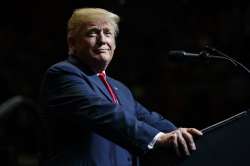President Donald Trump's decision to withdraw the United States from the 2015 Iran nuclear deal was very much anticipated. But days after the president walked away from the three-year-old deal, US officials said that further inspections of Iran's nuclear sites should continue.
Known as the Joint Comprehensive Plan of action (JCPOA), the deal between Tehran and major world powers forces Iran to open its nuclear sites to inspectors within 24 days.
Announcing his declaration to exit from the Obama-era accord, Trump had launched a scathing attack at the nuclear accord for lacking mechanisms to prevent, detect and punish cheating. He added that the deal's inspection provisions don't have the unqualified right to inspect many important locations, including military facilities.
Still, the US is keen on continuing with the inspections under the aegis of the International Atomic Energy Agency (IAEA), the UN nuclear watchdog.
However, the officials are sceptical about how long the inspections can survive, particularly if the US imposes sanctions on European companies for doing business with Tehran.
Earlier on Tuesday, Trump announced that he will restore the United States from the 2015 Iran nuclear accord and restore far-reaching sanctions aimed at severing Iran from the global financial system.
The 2015 agreement, which was negotiated by the Obama administration and included Germany, France and Britain, had lifted most U.S. and international economic sanctions against Iran. In exchange, Iran agreed to restrictions on its nuclear program, making it impossible to produce a bomb and establishing rigorous inspections.
Since his 2016 election campaign, Trump has opposed the deal, calling it a 'disaster' and 'one-sided' and exiting the deal was part of his campaign pledge. On Tuesday, he accused Iran of exporting missiles and fuelling state-sponsored conflicts across West Asia. He added that if the deal continued to stand, there would soon be a nuclear arms race in West Asia.
The US' exit has far-fledged implications. Oil prices are likely to rise and could lead to volatility in financial markets. The US has given European companies six months to wind up their businesses with Iran or face sanctions. Trump said that any country that helps Iran in its quest for nuclear weapons could face sanctions. But experts say that this hard-line will give Trump an edge over North Korean leader Kim Jong-Un ahead of their much-anticipated summit on June 12.
But Trump's decison may have very less impact on India-Iran oil trade. The relationship between the two goes beyond energy. India has committed more than $500 million to develop Chabahar port, which gives New Delhi access to Afghanistan, bypassing Pakistan. Dozens of pacts on trade, regional connectivity and investment were signed during Iran President Hassan Rouhani’s India visit in February earlier this year.. While the US decision may have implications on India’s foreign policy, trade relations are unlikely to be impacted.
Latest World News

